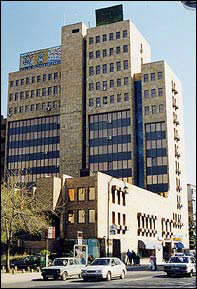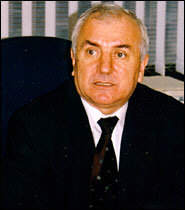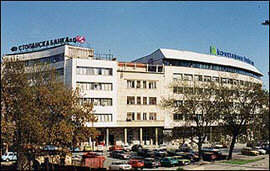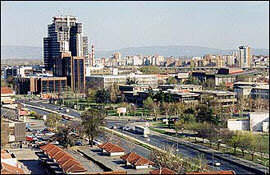 BANKING AND FINANCE BANKING AND FINANCE |

Macedonia has a financial system in transition to Western models. It consists of the National Bank of the Republic of Macedonia (central bank), commercial banks and savings houses or institutions, as well as insurance companies and a stock exchange. Inter-bank payments, including payments between banks and the National Bank, and all commercial financial transactions, are settled through the Payments Operations Service.
The traditional financial system is rather weak compared to Western standards, but it compares favorably to other former socialist countries. The use of cheques and credit cards is not widespread, and a large portion of small-scale financial transactions takes place in cash outside the formal market. In early 1993, a new banking law was enacted (Official Gazette No. 31/93), which permitted the establishment of private banks. Some of the traditional commercial banks face serious economic difficulties as a result of having relied heavily on direct injections of liquidity from the National Bank.
Restrictive fiscal and monetary policies have squeezed out most of the inflation but at the cost of drying up liquidity. Borrowing terms and conditions can be difficult. Some enterprises circumvent the banks and conduct transactions directly among themselves or through intermediary "financing" companies.
The Government is pursuing a strategy of bank rehabilitation, restructuring and privatization, which is presently underway and has started to produce significant results.
 National Bank National Bank |

The National Bank of the Republic of Macedonia is the country's central bank. Policy is implemented through a mix of monetary instruments, including reserve requirements, minimum and maximum liquidity of banks, National Bank bills, special liquidity credits and interest rate policy. The first years after independence witnessed volatility in the financial markets and banking sector, but conditions have settled down to a considerable extent. The National Bank has worked closely with the International Monetary Fund, the World Bank, and other international and national financial institutions in implementing an orthodox stabilization program. One of the main tasks of the National Bank is to re-capitalize the banks in Macedonia. "Re-capitalization of the banks will increase the credit supply and will lead towards interest rates decline," Governor of the National Bank Ljube Trpevski says.
 Commercial Banks Commercial Banks |

The commercial banking sector consists of 4 traditional banks, 17 private banks and 22 savings institutions. The savings houses are restricted to operations with households. They cannot lend directly to legal entities (i.e. businesses).
By far the largest of the traditional banks is Stopanska Banka, which has an extended branch network across the entire country. It had held about 65% of all assets and liabilities of the commercial banking system up until June 1995, after which this was reduced to approximately 45% as a result of a number of actions. Komercijalna Banka and Makedonska Banka (formerly Ljubljanska Banka) are the other two main traditional banks. Both have branches in some of the regional cities and towns. Komercijalna Banka itself was a part of Stopanska Banka until 1990, when it was essentially privatized. Tutunska Banka is the fourth traditional bank.
Due to the close ownership relationships between the banks and enterprises, credits were granted liberally even to loss makers. The Bank Rehabilitation Agency (BRA) was set up in early 1994 to assist the Government in rehabilitating the banking sector. The Law on Restructuring and Rehabilitation of a portion of the Banks was published in the Official Gazette 14/95. The BRA is taking over the non-performing Denar loans and managing the foreign credit liabilities of the traditional banks, as well as providing oversight of bonds issued by the Government. Stopanska Banka's "bad loans" are the first to be assumed by the BRA, which will attempt to dispose of them in the financial markets. Five independent banks were broken out of Stopanska Banka in the second quarter of 1995, in order to create greater competition in the banking sector. They are the branches located at Bitola, Kumanovo, Ohrid, Prilep and Tetovo. Since May 1993, some 15 new commercial banks have been licensed, but several have not survived or have not been re-licensed for safety and soundness reasons. The rules to establish a new bank, besides the usual licensing procedures, include having a minimum capital equivalent to DEM 3 million and DEM 9 million if foreign transactions are to be conducted.
There are no restrictions as to foreign ownership. Many of the commercial banks have correspondent relationships with banks in other countries and make use of the REUTER and SWIFT systems for transfers, but local banks still need to improve their worldwide communications. No West European, North American or Asian bank has yet established a direct presence in Macedonia, except for small equity participations by Austrian, Slovenian and Bulgarian interests. The Russian AKA bank has a branch in Skopje. The German Dresdner Bank and the Greek Ionian Bank have shown interest to enter the Macedonian Banking System.
|  Local Currency and Foreign Exchange Local Currency and Foreign Exchange |
Macedonia declared monetary independence in April 1992, when it introduced its own currency, the Macedonian Denar (MKD or DEN), initially on par with the Yugoslav Dinar. In May 1993, a new Denar, equivalent to 100 of the old units, was put into circulation. Denominations of coins are 0.50 (50 deni), 1, 2 and 5 Denars and bills are 10, 20, 50, 100, 500 and 1000 Denars. "Internal convertibility" of the Denar is permitted, that is any foreign currency may be traded for Denars in Macedonia. "External convertibility" of the Denar, i.e. trading abroad, is expected in a few years after IMF conditions have been met. There are no restrictions on the remittance of capital or dividends, which have been converted from Denars to foreign currencies. All enterprises in Macedonia must have local currency accounts and those that undertake international transactions, may have deposit accounts to hold foreign currencies for up to 90 days. Resident enterprises, however, may not open an account abroad without special permission. Individuals may hold both local and foreign currency accounts in Macedonia.
 Situation prior and after Macedonia's independence Situation prior and after Macedonia's independence |
Prior to independence, the commercial banks had incurred major foreign currency liabilities from foreign loans for development projects, which had been channeled through them, and from residents' foreign currency deposits, which had been re-deposited with the National Bank of Yugoslavia. The National Bank of the Republic of Macedonia has claims on the National Bank of Yugoslavia for these liabilities, currently amounting to the equivalent of about DEM 1.4 billion. The Government of Macedonia assumed the obligations for foreign credits guaranteed by the former Yugoslav Government and Institutions, which are subject to the "Paris Club." An overall rescheduling plan has been agreed and country-by-country negotiations are currently underway. Foreign commercial credits, which were given to Macedonian enterprises, are to be subject to negotiations in the "Zurich Club." The BRA is responsible for the collection of the foreign credits from the end users.

After independence all then existing foreign currency accounts held by individuals were put on hold. The new Government of Macedonia also assumed these liabilities, but has been unable to service them and they remain essentially frozen. The Government has taken several steps to sort out this situation. Since 1993 it has allowed these deposits to be used in limited amounts for certain purposes, such as emergency or essential needs: medical expenses, deaths, weddings, educational expenses abroad, and so on. Later it was permitted to use the deposits to acquire assets from the State, such as privatized apartments, shares in privatized enterprises, business real estate, as well as pay for customs duties, etc. It is unclear when or if the individuals will ever receive foreign currency cash for their deposits. However, a secondary market does exist for the frozen currency deposits.
Businesses may freely negotiate foreign currencies with licensed commercial banks. Individuals may convert foreign currency cash at licensed banks or at licensed bureau de change (exchange houses). Registered guests may also convert cash at their hotel. Generally only banks will cash travelers cheques, after presenting its passport. No identification is necessary at exchange houses, which are widespread. Credit cards are not generally welcomed, except by a few hotels or travel companies. Some major hotels may also cash travelers cheques for registered guests.
 Exchange and interest rates Exchange and interest rates |
Exchange rates are freely negotiated. The National Bank announces daily guideline rates based on data from commercial banks, amounts of currency bought and sold on the local foreign currency market, and information from international currency markets. Rates are adjusted daily and may vary among institutions. The posted National Bank rates are used for statistical and accounting purposes. Because of the high inflation of recent years, first the Dinar and then the Denar lost worth as stores of value. The freezing of foreign currency deposits also contributed to the erosion of confidence in the financial system. These factors fostered households' and businesses' preference for foreign currency as a store of value. The Deutsch Mark circulates widely and visibly plays the role of a parallel currency. Many transactions involving households and small businesses take place in cash, whereas medium and large businesses for the most part operate within the established financial systems.
There are no legal or administrative limitations or restrictions on interest rates. Rates are freely negotiated between banks and their customers. However, the National Bank and the Government supported the members of the banking unit of the Economic Chamber of Macedonia in signing a gentlemen's agreement, which, among other things, places a ceiling on interest rates. The ceiling is quarterly adjusted according to a formula that takes into account inflation. There are no penalties for non-compliance, but it has helped to diminish rates. The National Bank collects and publishes data on maximum and minimum nominal deposit and lending rates.
In the first months after monetary independence real interest rates on both the deposit and lending sides were negative. However, as monetary policy was tightened, nominal interest rates moved up while inflation declined, causing real interest rates to turn positive. Furthermore, there is a large spread between deposit and lending rates.
During the last quarter of 1995 lending rates for Macedonian Denars generally declined from 2.2% to 1.8% per month. The trend has been for rates to fall as inflation has moderated. Loans are generally granted for 30, 60 or 90 day periods, and occasionally to 180-day periods, with possibilities of rollover. Collateral required by the banks is real estate, foreign currencies, gold, etc. Mechanisms to make movables acceptable security are not yet in place. Only rarely will the banks disburse loans denominated in foreign currencies or not require security arrangements. Rates on term deposits vary from 1.0% to 1.5% per month, while those for an undefined term vary from 0.3% to 0.4% per month.
Borrowers should check on the rates currently in effect, and on the latest terms and conditions, before proceeding with financial commitments. |

